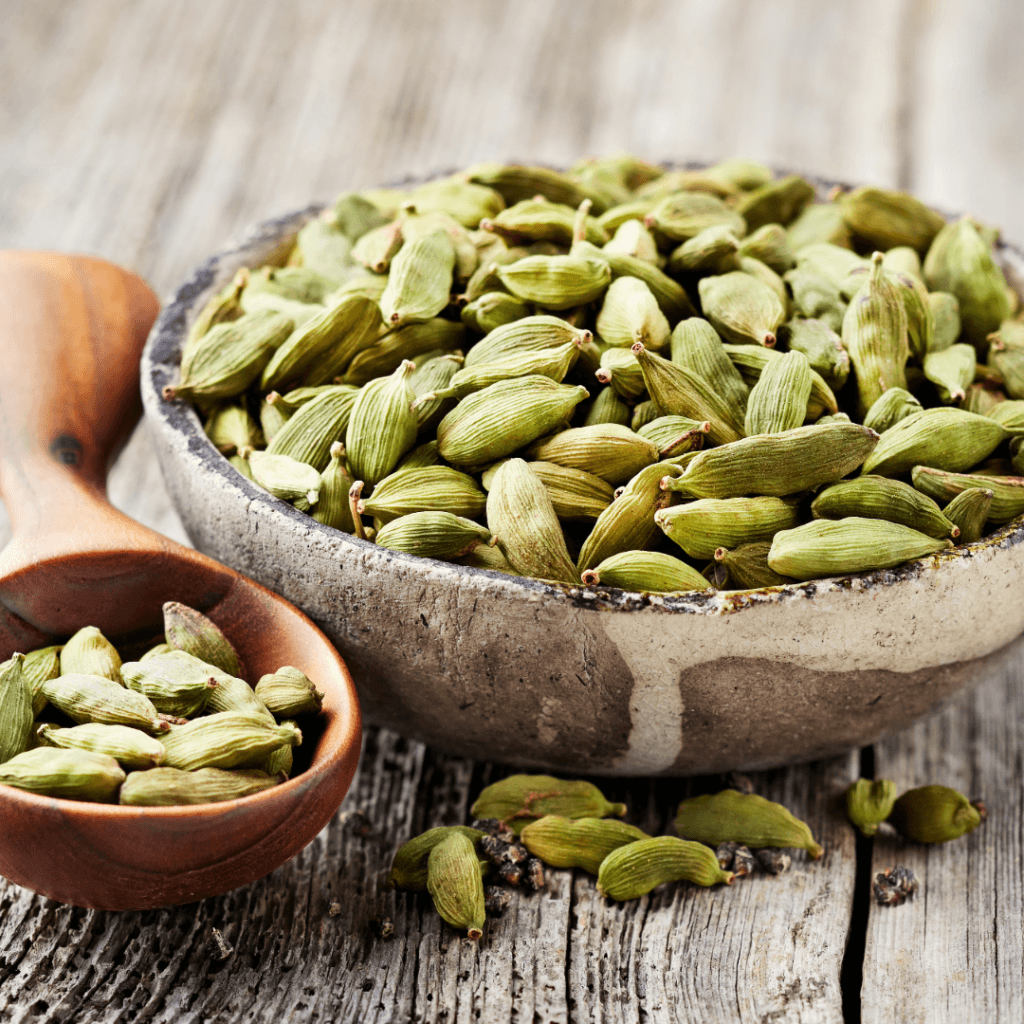Cardamom, often hailed as the “queen of spices,” is a cherished ingredient in both culinary and medicinal traditions, particularly in Ayurveda.
This aromatic spice not only enhances the flavour of dishes but also offers numerous energetic benefits that promote holistic well-being. In this article, we’ll delve into cardamom’s role in Ayurvedic healing and how it can positively impact your energy levels and overall health.

The Ayurvedic Understanding of Cardamom
In Ayurveda, an herb or spice is categorized based on its qualities (gunas) and its effects on the three doshas: Vata, Pitta, and Kapha.
Cardamom (known as “elaichi” in Sanskrit) is recognized for its warming, slightly sweet, and aromatic properties, making it beneficial for balancing all three doshas (increasing Pitta only when used in excess.)
1. Balancing Vata
Vata energy is characterized by qualities such as dryness, coldness, and irregularity.
Cardamom’s warming and soothing nature helps ground Vata, making it an excellent addition for those experiencing anxiety, digestive issues, or fatigue. Its calming effect can restore mental clarity and boost energy levels, particularly during Vata-dominant seasons like fall and winter.
2. Energizing Kapha
Kapha energy is associated with stability, heaviness, and lethargy.
While cardamom can help balance Kapha by providing a gentle invigorating effect. The spice’s stimulating aroma can uplift the mind and combat sluggishness, making it a great choice for enhancing motivation and alertness.
Cardamom can help to remove Kapha accumulation (excess phlegm or mucus) from the stomach and lungs.
3. Soothing Pitta
Pitta energy embodies heat, intensity, and sharpness.
Cardamom’s sattvic (calm and uplifting) properties help pacify excess Pitta, which can manifest as irritability, inflammation, or digestive discomfort. By helping to soothe intensity or irritability, cardamom can promote a sense of tranquility and balance, leading to improved flows of energy without the stress of overstimulation.
Your Ayurvedic Wellness Coach can help you to determine more about your doshas, and how cardamom can help you balance, detoxify and rejuvenate.
Herbal Energetic Benefits of Cardamom
1. Boosts Digestion
Cardamom is renowned for its digestive properties, promoting the production of digestive enzymes and alleviating bloating and gas. A well-functioning digestive system is crucial for maintaining energy levels, as it allows for optimal nutrient absorption. Consuming cardamom can enhance your overall vitality and help you feel more energized throughout the day.
2. Enhances Mood and Focus Naturally
The aromatic compounds in cardamom have been shown to improve mood and reduce stress. By calming the mind and enhancing mental clarity, cardamom can help you stay focused and productive, making it an excellent choice during long work hours or study sessions.
3. Supports Respiratory Health
Cardamom is known to clear respiratory passages and enhance breathing. Improved respiratory function can lead to better oxygenation of the body, which is vital for maintaining energy levels. Whether in the form of tea or added to your meals, cardamom can support a clear and open respiratory system.
4. Detoxification for Improved Immunity
Cardamom aids the body in detoxification by promoting kidney function and flushing out toxins. A cleaner internal environment can lead to increased energy and vitality, allowing you to feel more vibrant and less fatigued.
How to Incorporate Cardamom into Your Daily Routine
Cardamom is a delicate aromatic herb which does better when not over-heated or boiled. We tend to add cardamom to our food and teas after cooking is complete.
1. Cardamom Tea
Brew a soothing cup of cardamom tea by steeping crushed cardamom pods in hot water. This can be enjoyed in the morning to enliven digestion or as a calming evening beverage to harmonize energy in preparation for sleep.
2. Warm Cardamom Milk
Adding ground cardamom helps to neutralize the mucus forming properties of milk. With a dash of maple syrup or fresh honey, you have a satisfying and nourishing afternoon snack or before bed tonic.
3. Creative Cooking with Cardamom
Incorporate cardamom into savory dishes, desserts, or baked goods. It pairs well with rice, lentils, and various spices, enhancing both taste and health benefits. Ground cardamom is a great addition to whip-cream, butter cream icing or pumpkin spice soups.

4. Aromatherapy
Use cardamom essential oil in a diffuser to uplift your mood and invigorate your space. You can add a few drops in some sesame oil to use for a gentle belly massage to help to balance the digestive energy (samana vayu) helping to raise contentment and satisfaction.
Everyday Ayurveda and Cardamom
Cardamom is not just a flavourful spice; it is a powerful ally in Ayurvedic medicine that offers a range of energetic benefits. Learning more about the benefits of cardamom, through practice and experience is the ideal way to boost natural healing for yourself and your family.
Learn more about the differences between green and brown cardamom.
By incorporating cardamom into your diet and daily routine, you can promote balance among the doshas, enhance digestion, uplift your mood, and ultimately boost your energy levels. Embrace this aromatic spice to enrich your health and well-being holistically.
Join us to learn more about Ayurvedic Cooking, Ayurvedic Healing or the study of Ayurvedic Herbals.
References:
Frawley, David, and Vasant Lad. The Yoga of Herbs: An Ayurvedic Guide to Herbal Medicine. Twin Lakes, WI: Lotus Press, 1986.



